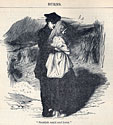
 Whittier was born in the outskirts of Haverhill, Massachusetts, in a farmhouse built by his grandfather in the 17th century. Both the religion and the geographical isolation of the Whittiers fostered the close family ties that were so important in Whittier’s life and work. As the second child and first son among four siblings, John Greenleaf was expected to help in the running of the farm, which provided for his family, as well as a maiden aunt and a bachelor uncle. However, John was a weak, delicate child and not at all suited for the heavy labor.
Whittier was born in the outskirts of Haverhill, Massachusetts, in a farmhouse built by his grandfather in the 17th century. Both the religion and the geographical isolation of the Whittiers fostered the close family ties that were so important in Whittier’s life and work. As the second child and first son among four siblings, John Greenleaf was expected to help in the running of the farm, which provided for his family, as well as a maiden aunt and a bachelor uncle. However, John was a weak, delicate child and not at all suited for the heavy labor.
As a child he attended a nearby school, read everything available in the household, and borrowed books from his schoolmasters. At fourteen he began writing poetry. He was encouraged in his efforts and given a direction by a schoolmaster, Joshua Coffin, who loaned him a book of Burns' poetry. Although Whittier never attempted to imitate Burns' style, in Burns Whittier saw an example of a humble farm boy using simple subjects. Whittier described his feelings later in a poem addressed to Burns.
Burns
No more these simple flowers belong
To Scottish maid and lover;
Sown in the common soil of song,
They bloom the side world over.Why dream of lands of gold and pearl
Of loving knight and lady,
When farmer boy and barefoot girl
Were wandering there already?
When Whittier was eighteen, living with his family and farming, his sister Mary sent one of his poems to the Free Press in Newburyport, a paper published by William Lloyd Garrison.
Garrison published Whittier's poem; his sister sent another, and so on, for weeks. The poems were signed only W. Haverhill, but Garrison found out where they were being mailed from and traveled to Haverhill to meet Whittier. He encouraged Whittier to continue his schooling, and through shoemaking and teaching, Whittier managed to raise the money for two semesters at Haverhill Academy.
 But teaching in the cold, one-room school was so hard on him that Whittier decided he couldn't continue his education and he didn't want to teach. When an article in the Palladium criticized the flogging in schools, Whittier’s comment was that the schoolmaster’s irritability was justified:
But teaching in the cold, one-room school was so hard on him that Whittier decided he couldn't continue his education and he didn't want to teach. When an article in the Palladium criticized the flogging in schools, Whittier’s comment was that the schoolmaster’s irritability was justified: “Let the editor of the Palladium fancy to himself the situation of an unfortunate pedagogue, surrounded by a few dozen ragged, graceless urchins, crowding to the old, rickety stove, where the poor man has taken his station, to avoid the keen breeze, which comes whistling through the crannies of the building, fresh from the northeast; and we are fully persuaded he would acknowledge that the trial was too much for human patience.” (Woodwell 18)
“Let the editor of the Palladium fancy to himself the situation of an unfortunate pedagogue, surrounded by a few dozen ragged, graceless urchins, crowding to the old, rickety stove, where the poor man has taken his station, to avoid the keen breeze, which comes whistling through the crannies of the building, fresh from the northeast; and we are fully persuaded he would acknowledge that the trial was too much for human patience.” (Woodwell 18)
While Whittier was thinking about what to do with a future other than farming or teaching, Garrison found him editing jobs, first at the National Philanthropist, then at American Manufacturer, Essex Gazette and the New England Weekly Review of Hartford, Connecticut, where Whittier lived for a year and a half before ill health forced him to return home. During this time he began writing the poems which would appear in his first book of poetry, Legends of New England in 1831.
In 1836, Whittier's brother, Matthew, married a non-Quaker, and the impossibility of bringing her home led the brothers to sell the homestead. They sold the farm for $3000, and with his share, Whittier bought a small house in Amesbury, near the Friends Meeting House, and moved there with his mother, his maiden aunt, and his younger sister.
Although Whittier wrote little about Haverhill when he lived there, his time in Haverhill provided him with the subjects and sensitivity for his greatest works; at least five of his best poems could not have been written without his childhood in Haverhill: Snow-Bound, “In School-Days,” “My Playmate,” “Telling the Bees,” and “The Barefoot Boy.” In later years he commemorated Haverhill in poetry: Haverhill’s 250th birthday, the dedication of the public library, a reunion of his class at Haverhill Academy, and Kenoza Lake (which Whittier named).
On the day of his funeral, his birthplace in Haverhill was draped in black, and in the city of Haverhill flags were at half mast, bells were tolled, city offices closed, and school teachers were instructed to stop teaching during the hours of the funeral and tell their pupils about Whittier and his writings. (Woodwell 527-8)

